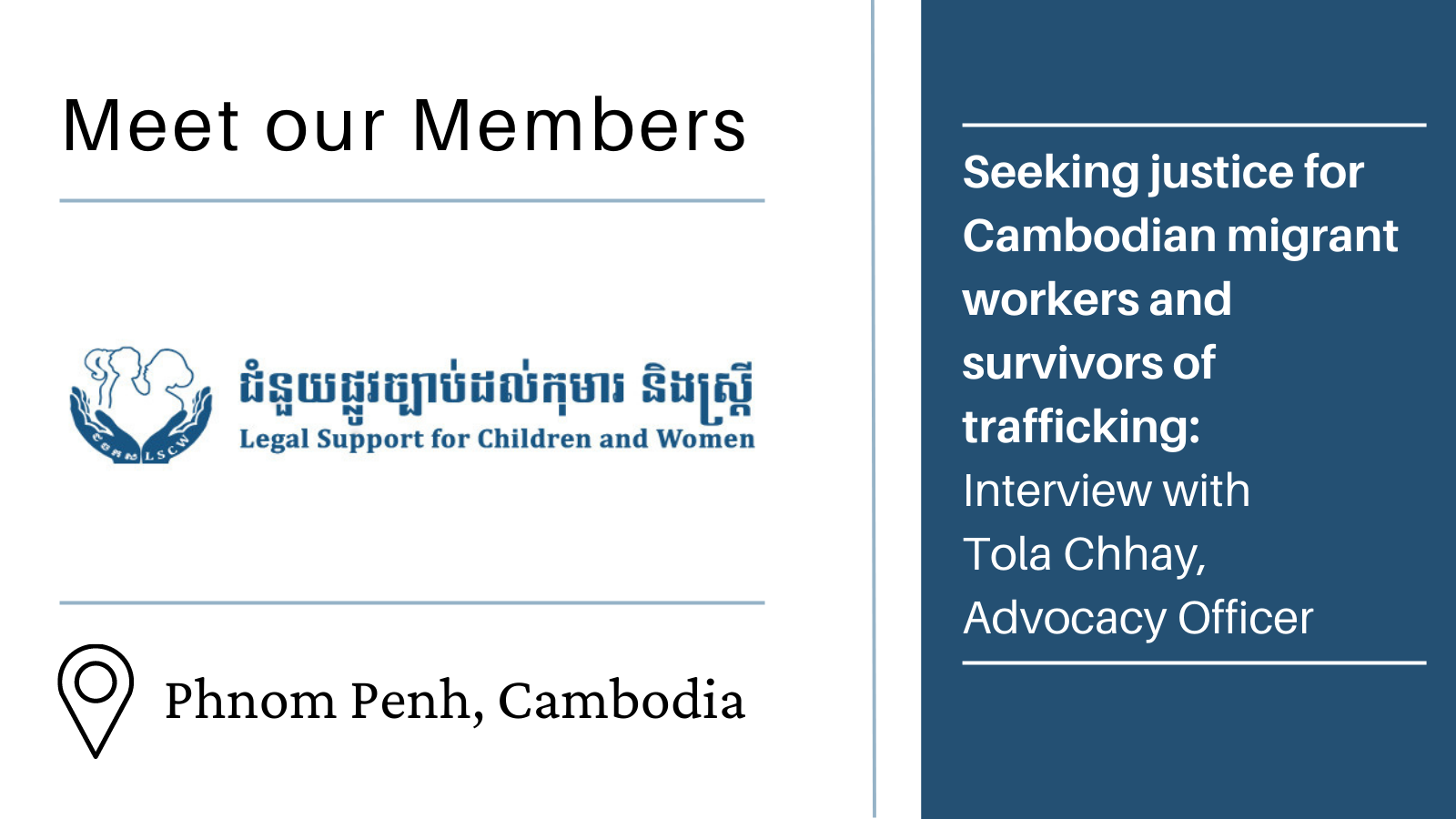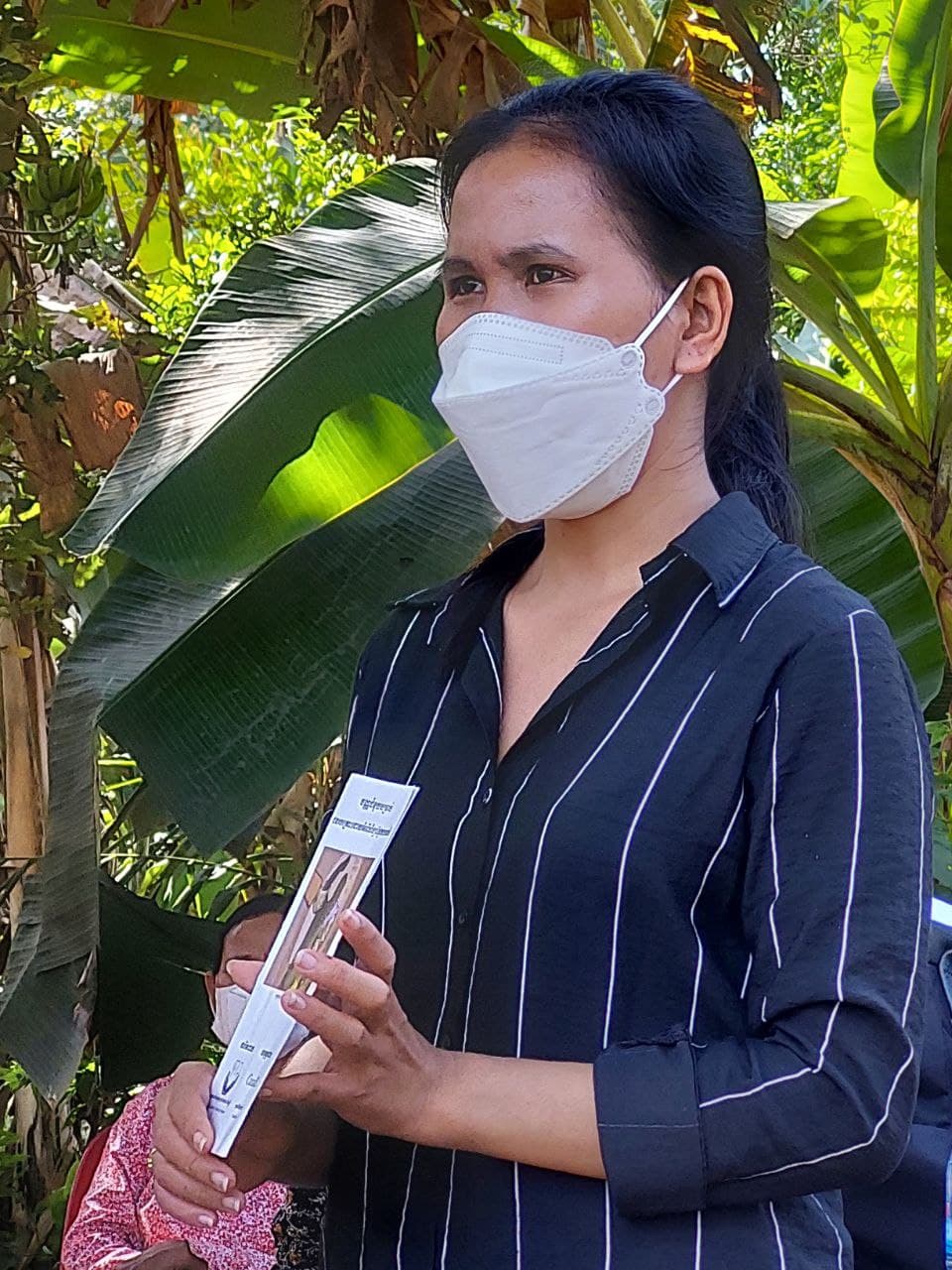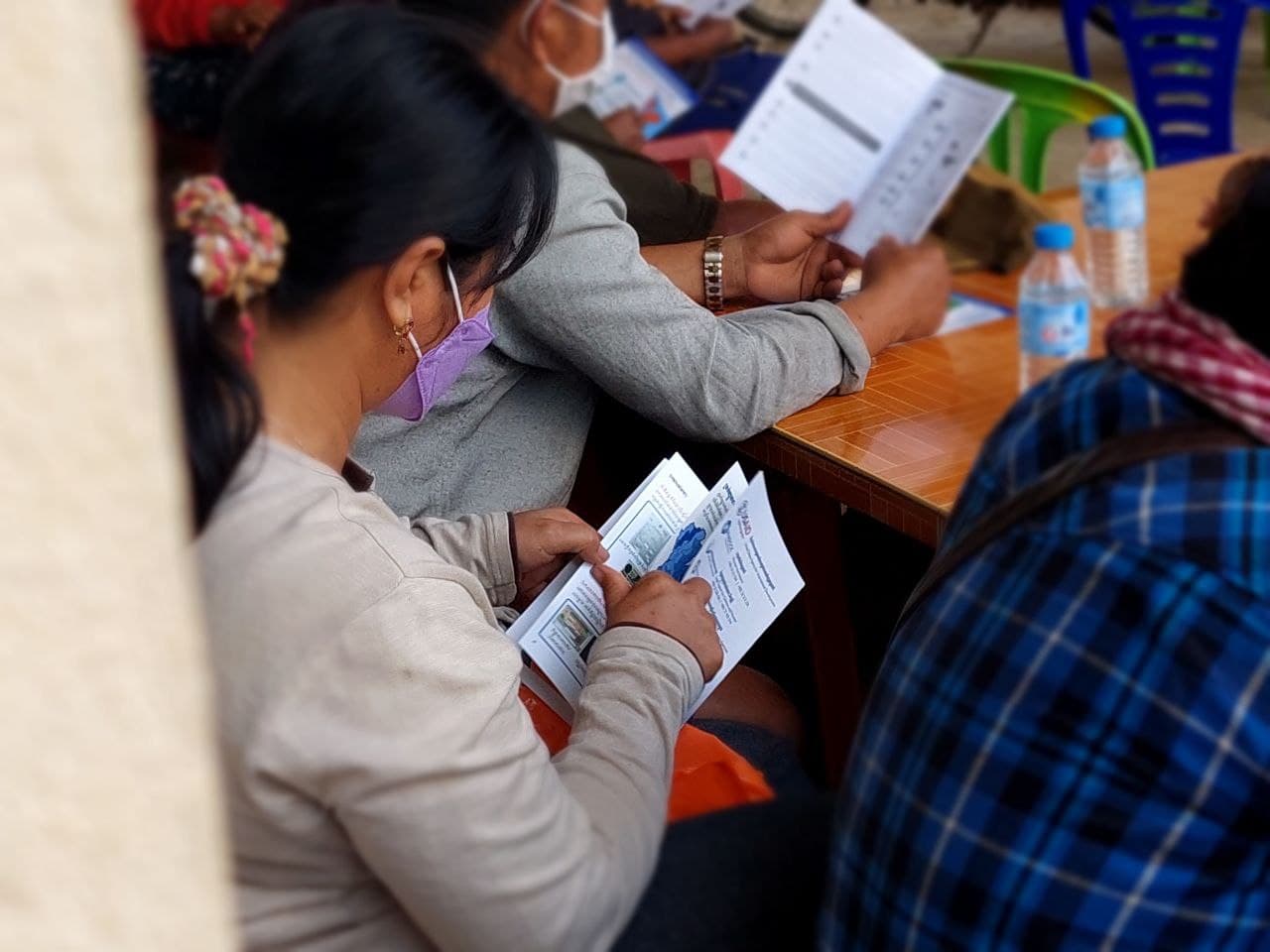
Lee la entrevista en español aquí
Legal Support for Children and Women (LSCW) is a GAATW member in Cambodia. In June 2022, Sumati Panikkar from the GAATW secretariat conducted this interview with Tola Chhay, Advocacy Officer at LSCW, to learn more about the organisation’s work.
Sumati Panikkar: Thank you, Tola, for speaking with me. Can you please tell me, when and why was LSCW founded?
Tola Chhay: LSCW was founded by Ms Ly Vichuta, a Cambodian citizen who is now a lawyer in Canada. She noticed that Cambodian migrants, especially in Thailand, face many problems not only with labour rights but also trafficking and they needed an organisation that can provide help to them. LSCW was started by volunteers and lawyers and was formally registered in 2002. Our mission is to help every Cambodian citizen live with dignity and decent quality of life and to protect the rights and dignity of Cambodian migrant workers. We focus on human trafficking, labour migration and gender-based violence. We provide legal aid, legal training, community empowerment, and networking with international and national partners for advocacy.
SP: So you started as a legal support group?
TC: Initially, LSCW worked to provide all types of legal assistance to meet the needs of victims, including cases of domestic violence, child abuse, fraud, trafficking, and labour exploitation. Currently, we focus only on cases of human trafficking and labour exploitation, because many organisations now provide services for children and women. The Royal Government of Cambodia has also established volunteer lawyer groups to provide legal protection to the poor, especially vulnerable women and children.
SP: What is the situation with migration and trafficking in Cambodia?
TC: The primary destination is Thailand because of the shared border, so it’s closer and easier to cross but Cambodian people also migrate to Japan, Korea, and Malaysia. Some go to Vietnam but not many. Most of the issues we come across, including cases of trafficking, are from Cambodians working in Thailand who are largely low-waged workers. We don’t work so much with workers going to, say Japan, because migrating there requires G2G, that is, government-to-government data-sharing. They receive pre-departure training and they know what to do if they need assistance.
Cambodians migrate to Thailand in two ways: they go through the MoU system for which they need to be documented. Or they go undocumented but will need to do the registration upon reaching Thailand to become a regular migrant worker. In the first case, they need to find an agency that has a license to recruit workers for Thailand. The agency processes the documents and brings them to the company where they can work. In the second case, Cambodian workers don’t go through an agency but via a broker or a neighbour, or on their own. When they arrive in Thailand, they can get their documents processed or registered and become documented. But for this, they need the support of the employer. Only if their employer is willing to help them in this process can they do this second step.
 On the question of why trafficking still happens on this border, the reason is that the process is costly and takes a lot of time. The waiting period can be up to 6 months. The workers don’t have much money and if they need work, they want to find it immediately, they don’t want to wait. Secondly, the recruitment agency needs to provide a pre-departure training, including all the information about the travel and work. But most of the agencies are not playing this role very well. Migrant workers are not aware of their rights or the available support in case of problems at the workplace. So they try to find another employer or a new workplace. If they’re lucky, they can find a better workplace. But there are brokers who take advantage of them and it can become a trafficking situation.
On the question of why trafficking still happens on this border, the reason is that the process is costly and takes a lot of time. The waiting period can be up to 6 months. The workers don’t have much money and if they need work, they want to find it immediately, they don’t want to wait. Secondly, the recruitment agency needs to provide a pre-departure training, including all the information about the travel and work. But most of the agencies are not playing this role very well. Migrant workers are not aware of their rights or the available support in case of problems at the workplace. So they try to find another employer or a new workplace. If they’re lucky, they can find a better workplace. But there are brokers who take advantage of them and it can become a trafficking situation.
SP: What are the main communities or groups you’ve been working with in the last few years?
TC: We are focused on all migrant workers. They can call our hotline number where we provide counselling and legal support. In Cambodia, we work with migrants’ families by providing information, capacity building and networking. Cambodians never call the authorities when they face problems, they first seek support from their families. That’s why we need to work with migrants’ families.
SP: How does the hotline work, do you get calls from the workers themselves or from their families?
TC: Most of the time we get calls not directly from the migrants but from the community – NGO partners, families, the embassy...
SP: What kind of help do hotline callers request?
TC: Mostly legal help. In addition to other migrant workers issues, we also provide legal support to migrants working on the fishing boats. They too seek legal aid and counselling.
SP: Do people ask for help with rescue?
TC: Usually, the migrants’ families have lost touch with them or the migrants can’t leave and that’s when the families call us.
 SP: What are some of the activities that you take up with the migrant workers?
SP: What are some of the activities that you take up with the migrant workers?
TC: We prepare simple materials with information that the migrant and their families need to know, like where to go if they have problems and so on. In terms of capacity building with the community, we have a focal person who has received our training and plays the networking role with the community and local authorities. They share information and observe any problems that can be reported to us. In terms of legal aid, we provide support to survivors of trafficking and exploited workers with the court processes and filing of complaints. Most people are not aware of the legal provisions. Sometimes they don’t even realise that they’re survivors of trafficking, so we have to work with them on that. We also provide repatriation assistance to those who can’t come back or are stuck.
In terms of our network, we work at both the national and international levels. In Cambodia, we have the National Committee to Combat Trafficking (NCCT) and committees at the provincial level. We work at each level to provide information and advocacy. We have also created a Technical Working Group (TWG) with other CSOs as a platform to share information, respond to issues and advocate to support migrant workers and victims of trafficking, especially in the fishing industry. We are the secretariat of the TWG. The TWG is now focussed on three topics. The first is compensation fund for trafficked persons - the goal of the advocacy is to lobby the government to develop a special fund to support trafficked persons while waiting for the remedies through judicial system. The second is the issue of bilateral agreements between Cambodia and Thailand on the employment of Cambodian workers on Thai fishing boats. And the third is the identification of trafficked persons. The TWG also plays the role of a monitoring body on the implementation of policy and legal frameworks such as bilateral, regional, and international instrument for the protection of Cambodian migrant fish workers in Thailand and to support all the victims.
Why did we pick these issues? Through LSCW's past practice and experience in handling cases, it was clear that most victims and their families do not receive court-ordered compensation, as most of the perpetrators arrested are former workers who just follow the diktats of somebody else above them. They may be relatives or fellow villagers of the victims. The real culprits, or the masterminds of the cases, are never caught. So, providing assistance to victims during the legal process is very important as these cases always take a long time. Victim identification is important because due to the non-recognition of the identification procedures between countries, the victims are not correctly identified, and end up being considered as undocumented migrants.
Cambodia has an MOU with Thailand, but it doesn’t include fishery workers, so we don’t have a system that can provide the necessary support and protection of Cambodian workers in this field yet. And fishery is a job that is considered to have a higher risk of trafficking than any other sector in Thailand. LSCW has been helping workers on fishing boats who have been trafficked, but there have not been any cases where victims have received compensation from the boat owners or the perpetrators, neither has the Royal Government of Thailand acknowledged them as victim of trafficking.
SP: What are the main challenges that you face in your work?
TC: I joined LSCW during the COVID-19 pandemic. The pandemic was a huge problem for us. We don’t know about destination countries, but we didn’t have many cases and we didn’t know why. It’s because during Covid, many migrant workers had to return or were stuck abroad. Many didn’t receive their wages or couldn’t work. The government created a repatriation process for the migrant workers who were returning. NGOs weren’t allowed to speak with migrants directly due to Covid. The government could but they didn’t ask about working conditions. They only asked about their name, hometown, and whether they are Covid positive or not. At the same time, many of the workers had mental stress after coming back and we can understand that they didn’t feel like sharing their problems immediately. They just wanted to reach their homes as soon as possible. It’s more likely that cases were not reported, rather than there were no cases.
SP: Do you have other challenges?
TC: Yes, another issue is that most Cambodian migrant workers are not comfortable to share their situation. The men, especially, think that they have to be strong and continue with their condition… that when the employers ask them to do something they have to do it because they are paid to work. They don’t recognise that they’re in a situation of human trafficking. First, we have to make people aware about their situation. Second, we need closer cooperation with the community. Survivors need to feel safe to trust us if they file complaints against traffickers, because they know that those people are powerful. Another problem is that even after filing cases and going through the process, they don’t receive any compensation from the broker or the perpetrator. The person we usually find is the one living in the community, but not the big boss.
SP: This is very interesting, tell me more about the brokers or traffickers.
TC: Most migrant workers are not aware that a particular person is a broker. The brokers are usually people who themselves have previously migrated for work by paying another person to take them. After many years of migration, they’ve gained experience, so they start bringing other people from the community to work. But they don’t take any responsibility for them. Some of these brokers bring the workers from their community directly to workplaces. Others bring them to the Thai border, where a broker from Thailand comes to take them to the destination. It’s like a business. Some of the traffickers are former victims themselves. Usually this happens to migrant workers in the fishing industry.
SP: Do you try to include the voices of the trafficked people in your work and strategy? And if so, how do you do that?
TC: Yes, we try to bring in the voices of survivors in our community empowerment work. Some of them become focal persons in the community and join our meetings. We also speak with migrant workers and include their views in our reports and invite them to meetings to share their perspectives.
 SP: What can you tell me about women migrants?
SP: What can you tell me about women migrants?
TC: Comparing men and women migrants, I can say that women face more challenges. Even when they work in the same position, women get lower wages than men. Secondly, factories don’t allow the recruitment of women who are pregnant. In the workplace, during the recruitment process and in the factories, women are not given the opportunity to speak. The working and living condition not suitable to women’s specific needs, they only cater to men. We’ve also seen many cases where women survivors of trafficking come back to their homes but don’t share anything about their ordeal to their families or community because they’ll be rejected. This is why many cases go unreported. When they call us to report, we don’t ask their names. We just provide anonymous counselling.
SP: Why are they rejected by the families?
TC: In some cases, it is trafficking, and in other cases there’s been abuse by other workers or by the employers. In Cambodia, there is still a belief that women who have faced such issues are ‘bad women’. Many times, the women too think it was their own fault. These things take time to change, but in the meanwhile we really need to support their mental health. LSCW does not have a mental health specialist, but we try to involve them in our community forums and self-help groups meetings. Many feel more comfortable to share with us rather than their families. We also try to persuade them to file complaints. They say that they are fine with it, but their families won’t be as they consider it as bringing shame. We follow the ‘no-harm’ principle, where we leave the decision to them.
SP: I don’t have any other questions. Is there anything else you’d like to add?
TC: As I said, we don’t have specific person for mental health, but we do refer them to other partners or the government. Survivors trust us, but during the legal process, they need to repeat their painful story many times. We don’t want them to go through that. Sometimes, our staff is also affected by listening to survivors’ stories. Working with the legal processes is costly and time-consuming. So it’s difficult for us as an NGO, because we have limited funds. And for the communities, it’s difficult because need livelihood support, they are very poor, and they have to support their families.
Many times, there are powerful people behind these recruitment agencies. The only way that the recruitment agencies in Cambodia can have license is if they have a lot of money. Some of them have close contact with the government too. So it’s also very difficult to challenge them legally.
SP: Thank you so much for speaking with me and telling us about your work.
